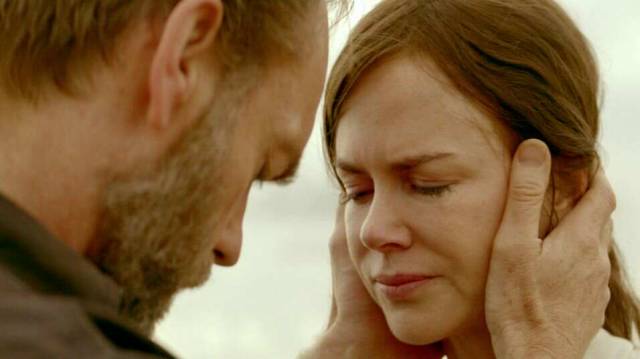
 Tensions are already running high when we meet the Parker family, recently transplanted to the remote Australian town of Nathgari following an incident involving precocious teenage daughter Lily (Maddison Brown). Each family member is struggling to adjust in their own way. Matthew (Joseph Fiennes) is short tempered and overcommitted to his new job at a local pharmacy while Catherine (Nicole Kidman) spends her days at home, bored and unfulfilled. Tommy (Nicholas Hamilton) trails his older sister, Lily, by day while she skips school and welcomes the flirtations of local boys. At night, Tommy walks the abandoned streets alone while Lily broods into her diary behind closed doors. On numerous occasions, the family reminds Lily that she is the reason they are there. Then one night, as a dust storm approaches, Lily and Tommy seemingly disappear into thin air. Local cop David Rae (the always striking Hugo Weaving) is tasked with finding them and search parties are sent into the fatally uninviting desert while an understandably frantic Catherine and Matthew slowly unravel, mercurially turning on each other and struggling to keep their destructive impulses at bay.
Tensions are already running high when we meet the Parker family, recently transplanted to the remote Australian town of Nathgari following an incident involving precocious teenage daughter Lily (Maddison Brown). Each family member is struggling to adjust in their own way. Matthew (Joseph Fiennes) is short tempered and overcommitted to his new job at a local pharmacy while Catherine (Nicole Kidman) spends her days at home, bored and unfulfilled. Tommy (Nicholas Hamilton) trails his older sister, Lily, by day while she skips school and welcomes the flirtations of local boys. At night, Tommy walks the abandoned streets alone while Lily broods into her diary behind closed doors. On numerous occasions, the family reminds Lily that she is the reason they are there. Then one night, as a dust storm approaches, Lily and Tommy seemingly disappear into thin air. Local cop David Rae (the always striking Hugo Weaving) is tasked with finding them and search parties are sent into the fatally uninviting desert while an understandably frantic Catherine and Matthew slowly unravel, mercurially turning on each other and struggling to keep their destructive impulses at bay.
What could play out as a familiar procedural is rendered instead as a slow burning psychological combustion. Director Kim Farrant sets up a simple, beguiling mystery and let's us, and her characters, simmer in it. And they do literally simmer; the sweltering heat hangs over everything, pushing everyone to their limit. Audiences craving tidy plot resolution may struggle with the film's ambiguities and unexploited red herrings, but those willing to embrace the subversion of their expectations may find a confident, measured study in chaos unfolding in an ordinary world where the patterns we want to see may lead nowhere and outcomes may hinge on mere coincidence. This kind of opaque mystery follows loosely in the tradition of Australian classics like Picnic at Hanging Rock and Jindabyne, although it does not quite reach the same level of transcendence.
The haunting, searching cinematography captures the oppressive heat, the deadbeat, middle-of-nowhere town and the great, wild Outback; giving it nearly as much screen time as the leads. Images of snakes abound, in Lily's diary, local folk tales and the winding paths that run through the seemingly endless outback. Most of all, though, this is Kidman's movie. As she moves into the phase of her career where she will inevitably be playing more and more mothers of grown children, Strangerland (like the recent Stoker) announces that she will not be going gently into that perilous night. Much more than a fretting, hand-wringing mother, Catherine is a complexly drawn woman: a harnessed free spirit, sometimes passionate, sometimes reckless; a frustrated, but mostly compliant, wife; a loving mother who doesn't know how to connect and a woman of powerful longing and sexuality. As a wave of emotions slowly melt Catherine's inner world, Kidman's performance is both compassionate and mesmerizing. The film hinges on the tension and chemistry between Catherine and Matthew.
Strangerland is a slow, moody film with a vivid and complex emotional core. More psychological study than thriller, dipping occasionally into melodrama. It finds its raison d'etre in Kidman, who really begs to be utilized more frequently, and more challengingly, on screen.